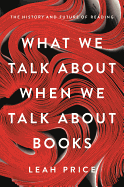
Video killed the radio star, goes the song. Then the bells tolled for books, victim to increasing distractibility and the digital revolution.
Actually, not so much, argues book historian Leah Price in What We Talk About When We Talk About Books: The History and Future of Reading. In the years since (and before) Nicholas Carr's 2008 Atlantic article asking "Is Google making us stupid?" literacy researchers have found ample evidence to suggest otherwise.
Price (The Anthology and the Rise of the Novel; How to Do Things with Books in Victorian Britain; Unpacking My Library) argues that a longer view of reading might ask us to more closely examine the different uses readers put texts to, not just the differences between print and digital works. She takes to task the myth of exceptionalism--contemporary readers' "sense of living through an unprecedented change"--and argues that there exists neither an "ideal reader" nor a "self-made reader."
A longtime Harvard professor and founding director of the Rutgers Book Initiative, Price is also funny, having fun with form and often infusing her extensive research with humor: "Perhaps print is to digital as Madonna is to whore: we worship one but use the other." Likening public libraries to public swimming pools, both become "testing ground for hopes and fears about civic connection."
And reading does connect us. Reading can be a luxury, a prescription, a requirement, a treat; Price's book is all of the above. As a librarian might say, check it out. --Katie Weed, freelance writer and reviewer

